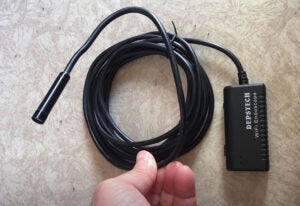
As builders of our own aircraft, we know there are many enclosed areas inside the fuselage and wings that may never be seen again once construction has been completed. Access panels and covers (if your plane has some) do provide a good effort at letting us see inside critical areas. But time and time again, you may find the need to peer into inaccessible places for maintenance or troubleshooting. For example, checking an electrical connection on a switch mounted in a congested instrument panel may require some pretty tough neck stretches on your back to get a good view. Ever need to look for a leak on a hose connection that got buried under other components that would have to be removed in order to get an unobstructed view? My personal guarantee is that your homebuilt will end up with fasteners (nuts, bolts, cotter pins) and connections (plumbing, cables and electrical) that will get sealed off from view once your aircraft is completed.
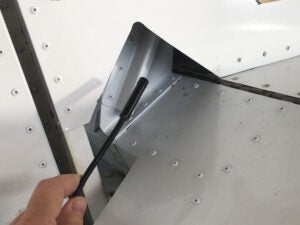
To the rescue: the snake camera (aka endoscope or borescope). While this type of tool has been around a long time, only recently have they become more sophisticated and quite inexpensive. The goal is to have a tiny camera that can snake itself into tight areas and produce a clear, sharp display to view. One reason they have become so affordable is that they can use your existing smartphone for the high-res display. This leaves only the camera and associated electronics to get the image to your phone. While it is true that you get what you pay for, the models from Amazon for $35 do a wonderful job. You can opt for more sophisticated models, but that is not really necessary in most cases.
I have used my $35 model to peer into my wing gas tanks (while nearly empty) to see the operation of the fuel level floats. Quite a bit of fuel is needed to raise the float off the bottom, I discovered. I can examine the otherwise hidden pulleys used by the control cables driving my aircraft’s elevator. As long as you have an opening large enough for the tiny camera to enter, you then have access to the hidden world inside dark enclosures like the fuselage. Did I mention the camera has a tiny LED light that illuminates the area in front of the camera? Using the snake camera for examining plugs and cable connections under the instrument panel makes a difficult task easy and stress-free. Think of this tool as a high-tech replacement for that little round inspection mirror.
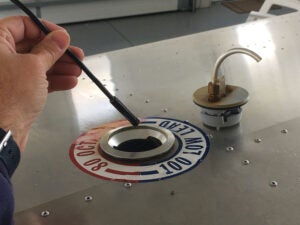
When shopping for a snake camera (Amazon has quite the selection), pay attention to some basic features. If using your smartphone for the camera display, note how the camera communicates with your phone. Mine uses a Wi-Fi signal to send the picture. Also check that the snake camera is compatible with your type of smartphone. Make sure the camera has an LED light that can be turned on for viewing dark areas. Consider the length of the camera cable, which is the part you hold onto as you snake the camera to its intended target. And be aware of the size of the camera head. This determines if you can gain access through a small opening. My inexpensive snake also has a nifty mirror attachment that allows it to “look” perpendicular to the barrel end if that is required. As always, check the owners’ reviews when making your selection—and read their comments.
For thorough aircraft inspection and repairs, you can’t beat the ability to see around corners in those hidden areas with your snake camera!





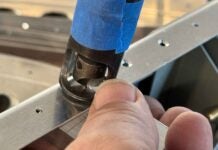



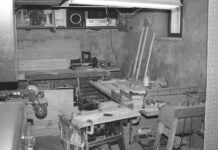




For anyone who does their own condition inspections I’d say a borescope is about a must these days, if only because you can use them to check the condition of the valves and walls in your engine cylinders. And for that, the little mirror deal doesn’t cut it in my experience. For that you need a borescope with a 180 degree articulating end such as the ones made by Vividia. Yes they’re more expensive, starting at around $200, but as with anything, you get what you pay for.
Excellent comment. I too wondered about the valve view question. My Costco wonderment camera does not make the cut.
Inserting an electrical camera / lighted probe into a fuel tank full of combustible fumes doesn’t seem like the ticket to a long life.